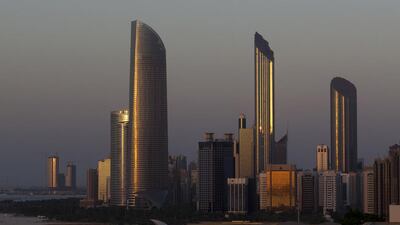Output in the UAE private sector reached a 32-month high last month, although the overall rate of growth in activity eased.
The readings from HSBC’s purchasing managers’ index meant business performance ended last year with the strongest quarter in the survey’s history.
“This is an exceptionally strong score,” said Simon Williams, the chief economist at HSBC Middle East and North Africa. “It points to a domestic economy growing strongly and suggests that momentum from the end of last year will carry through to this year.”
The survey measures on a monthly basis output across about 400 non-oil private sector firms.
The overall headline index eased from the record 58.1 points in November to 57.4 last month. A score above 50 marks growth, while below that level shows contraction.
But strong market conditions and increased new business helped the pace of output expansion to accelerate at the quickest pace since April 2011.
New orders also rose strongly, with 41 per cent of panel members indicating growth. Although the rate of expansion was down marginally from November, it was still the second-quickest in the series’ history.
New export orders rose at the slowest pace in four months.
But the data pointed to a rise in inflationary pressure that HSBC says is likely to build further this year.
A total of 12 per cent of panel members reported higher input costs during the month. Purchase prices rose at their fastest pace in more than a year.
In response to higher input costs, companies raised their charges during the month. It was the first time in three months, businesses increased their prices.
In an indication of potential future inflationary pressure, the index measuring the backlog of work accumulated by businesses rose to a new high. Companies cited new orders as the main reason for the rise in work-in-hand.
HSBC forecasts inflation to edge up to 5 per cent this year, the highest rate since 2008 as rent and labour costs push higher.
“This is a problem driven by success,” said Mr Williams. “If you ask businesses if they would rather manage inflation in the strong growth environment of 2014, or low and falling prices in the weak growth environment of 2008, I think most would choose 2014.”
Still, the data showed the higher prices had not yet fully translated into wage growth for staff. Wage inflation was unchanged compared with the previous month.
To cope with higher demand, companies hired more staff, although the rate of job creation eased from the previous month.
In a reflection of another GCC economy performing strongly, Saudi Arabia’s PMI score grew to a nine-month high of 58.7 last month, up from 57.1 in November.
The data showed efforts by the kingdom to promote the employment of nationals in the workforce was having little positive impact, according to Capital Economics. Last year, the government intensified its efforts with a crackdown on illegal migrant workers.
“Worryingly, there are some early signs that firms are now facing higher labour costs,” wrote economists at Capital Economics in a research note. “The staff costs PMI component rose to its second highest level on record last month.”
Finally, Egypt’s PMI reading came in at 52, slightly below November’s 52.5 score. Still, it marks the second consecutive month in which the reading has been above 50, suggesting the economy is continuing to recover from the instability after its second revolution last summer.
tarnold@thenational.ae

